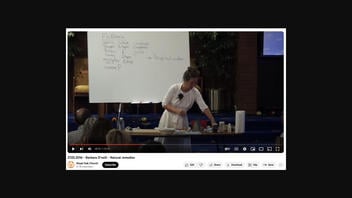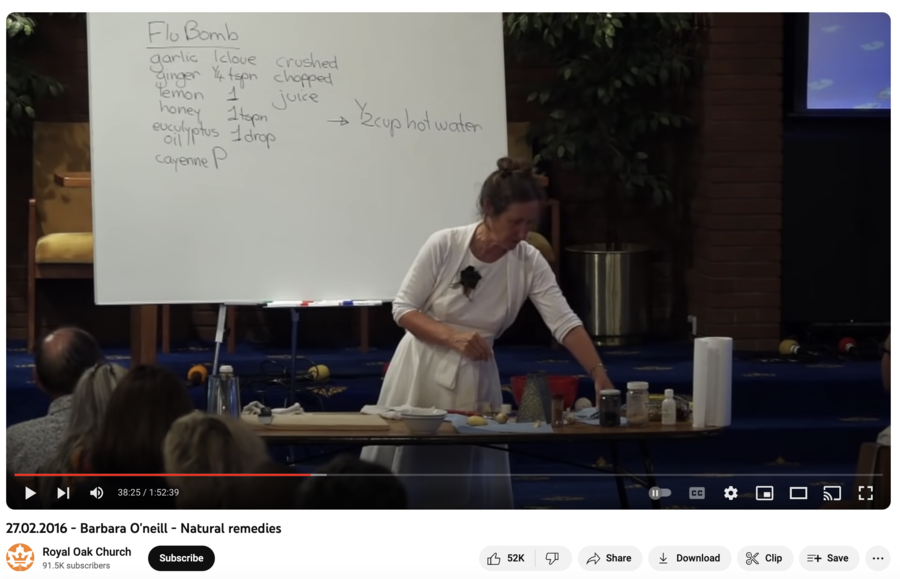CORRECTION -- STORY UPDATED: check for updates below.

Is a "potato poultice" a proven effective treatment for tissue inflammation? No, that's not true: Though potatoes contain certain antioxidant and anti-inflammatory properties, Lead Stories found no evidence that externally applied potato poultices are scientifically proven to treat inflammation. A nutrition expert confirmed to Lead Stories that most accounts describing potato poultices are outdated and anecdotal.
The claim originated in a nearly two-hour-long video shared on YouTube on April 2, 2016, titled, "27.02.2016 - Barbara O'neill - Natural remedies," on the Royal Oak Church channel. At the 38:25 mark in the video, O'Neill makes the claim that a potato poultice heals tissue inflammation:
Now, for tissue inflammation, potato. The humble potato. Now, the potato is very good at reducing tissue inflammation. So, this would be something like a swollen infected finger. It would be something like a swollen ankle ...
What you do is you just scrape that potato, we've got a tiny little potato but that's usually all you need because if you do too much, it becomes too wet and there is nothing worse than leaking poultices ...
With the potato, it's very alkalizing and when you've got inflamed tissue it's very acid and potato is high in potassium and phosphorus, and both of those are absorbed by the skin to help with the healing.
This is what the post looked like at the time of the writing of this fact check:
(Source: YouTube screenshot taken Tues Oct 31 09:20:41 UTC 2023)
Melissa Prest, a Chicago-based registered dietician nutritionist and spokesperson for the Academy of Nutrition and Dietetics, confirmed that there is little evidence either way. There "have been no recently published studies that support or do not support the use of potatoes in poultices," she said.
A recording of the video resurfaced in this September 2, 2023, Facebook post.
Though potatoes contain antioxidant properties, Lead Stories found no evidence that potato poultices are scientifically proven to treat inflammation or other infections.
"Potatoes do contain nutrients that are anti-inflammatory like resistant starch, vitamin C, fiber, and anthocyanins," Prest wrote to Lead Stories in an email received on November 10, 2023.
"While you typically get the most benefit from consuming foods high in anti-inflammatory properties, you can absorb very small amounts through your skin if you apply the food directly on your skin. This is typically a negligible amount so consuming your nutrients is your best option and will allow your body to digest, absorb, and utilize them when you have inflammation."
The woman speaking in the video is Barbara O'Neil, who, according to this September 24, 2019, public statement issued by the Health Care Complaints Commission of New South Wales, Australia, is an "unregistered practitioner," who "makes dubious and dangerous health claims regarding infant nutrition, causes and treatment of cancer, antibiotics and vaccinations that are not evidence based or supported by mainstream medicine."
A poultice is the direct application of fresh herbs to the skin, often moist, crushed and spread over a cloth over the skin to treat parts of the body.
Inflammation, meanwhile, is the body's activation of the immune system. When attacked, the body sends out inflammatory cells that attack bacteria or heal damaged tissue. Inflammation is used to fend off viruses, bacteria or toxic chemicals and heal injured tissue, resulting in bruising, swelling or redness, according to the Cleveland Clinic.
"Inflammation is our body's natural response to healing during illness or with an injury. Your white blood cells become activated to attack foreign bodies like bacteria and viruses. We may feel some pain, soreness, or tenderness at the injured site or even have some redness and warmth in the area. That will subside once the body has healed," Prest told Lead Stories.
Chronic inflammation can indicate more serious conditions, such as autoimmune disorders, infection or exposure to toxins. Chronic inflammation should be treated by a doctor -- not with a potato poultice.
Treatment for inflammation depends on the type experienced. For chronic inflammation, experts recommend speaking to a health care provider about supplements and nonsteroidal anti-inflammatory drugs like ibuprofen or steroid injections. Diet, exercise and healthy lifestyle choices can also help improve inflammation.
Prest added:
Depending on the cause of inflammation there are a variety of ways to treat it. If it is from an illness, rest and consuming foods that are higher in protein, zinc, vitamin C, and other antioxidants can help fuel your immune system. If it is from an injury to your body like a scratch or scrape make sure to keep the wound clean and dry and cover it to prevent infection. If you have redness and swelling, ice may be helpful in relieving those symptoms. If you have a lot of pain talk to your provider about ways to manage it.
Potatoes have been shown to hold antioxidant properties and some research indicates that potato properties may hold wound-healing potential. However, there is no concrete evidence that potato poultices can effectively treat inflammation in humans nor should they be used in place of recommended treatments.
"Poultices have been around for centuries and while there is some research that shows potential symptom improvement with poultices made from herbs, plants like aloe, and other sources, potato poultices are likely not your best option for treating inflammation," Prest added.
A search through Google Scholar using the keywords "potato inflammation" (archived here) returned dozens of studies that found links between the consumption of potatoes and certain anti-inflammatory effects, including both in-vitro (in a lab setting) and in-vivo (in living organisms) studies.
By and large, the majority of these studies concluded that further research and controlled clinical trials are needed to define further and understand their role in human health.
Importantly, there is no evidence to support O'Neill's claims that a poultice made of spuds could effectively treat inflammation.
As Lead Stories has previously reported, O'Neill was permanently prohibited by the New South Wales Health Care Complaints Commission (HCCC) in 2019 from practicing any form of health care after an investigation revealed her spreading of misinformation had breached the Code of Conduct for Unregistered Practitioners.
Lead Stories has debunked other false health claims made by O'Neill, including that cayenne pepper heals stomach ulcers, that bras made of unnatural fibers cause breast cancer and that castor oil compresses applied to the abdomen "heal" the colon to treat diarrhea and constipation.
Updates:
-
2024-03-21T18:17:14Z 2024-03-21T18:17:14Z This debunk has been updated to correct a misstatement about the place in which O'Neill was sanctioned. Her privileges were revoked in New South Wales, Australia.


















